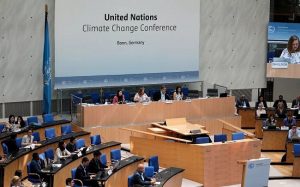Discussions on several climate change issues kicked off on Monday, June 3, 2024, in Bonn, Germany, and will continue over the next 10 days.

In his opening remarks, Simon Stiell, the Executive Secretary of the United Nations Framework Convention on Climate Change (UNFCCC), emphasised the critical role of financing in combating climate change.
“We have a lot of work ahead of us,” Steill stated. “People talk about the architecture of the Paris Agreement, which all countries have agreed upon. It’s important to note that the design is complete. Our task now is to fully operationalise this mechanism.”
Stiell stressed the importance of each component of the Paris Agreement working at full capacity and in harmony, highlighting the significance of adequate financing.
“We need to make serious progress in climate finance. We need more funding and must explore new and innovative financing sources beyond the climate change negotiation process. Additionally, we must move towards improving the carbon market, which can free up more resources for adopting and financing national climate plans,” he added.
“Moreover, we must move towards improving the carbon market. This could free up more funds for adopting and financing national climate plans,” he said.
The outcomes of the discussions held during the climate conference in Bonn will significantly influence the decisions made at COP29 in November this year in Baku, Azerbaijan.
The Bonn conference is addressing critical issues such as climate finance, national climate action plans, ensuring a just transition from fossil fuels, and national adaptation plans.
The article notes that one of the key objectives at COP29 will be setting new targets for climate finance from developed countries to supporting developing nations.
“At the conference in Bonn, countries will need to reach agreements that will serve as the basis for negotiations at the UN climate conference in Azerbaijan. This will help determine what climate finance could look like after 2025, as well as interim targets for mitigation, adaptation, loss and damage. It will also help determine the form in which funding will be provided – whether as grants or loans,” the material emphasised.
